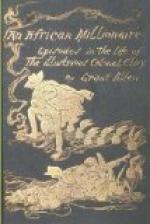Charles held to him with a fierce grip. “Mind he doesn’t break away, Sey,” he cried. “He’s playing his old game! Distrust the man’s patter!”
“Take care,” the prisoner put in. “Remember Dr. Polperro! On what charge do you arrest me?”
Charles was bubbling with indignation. “You cheated me at Nice,” he said; “at Meran; at New York; at Paris!”
Paul Finglemore shook his head. “Won’t do,” he answered, calmly. “Be sure of your ground. Outside the jurisdiction! You can only do that on an extradition warrant.”
“Well, then, at Seldon, in London, in this house, and elsewhere,” Charles cried out excitedly. “Hold hard to him, Sey; by law or without it, blessed if he isn’t going even now to wriggle away from us!”
At that moment Simpson returned with a convenient policeman, whom he had happened to find loitering about near the area steps, and whom I half suspected from his furtive smile of being a particular acquaintance of the household.
Charles gave the man in charge formally. Paul Finglemore insisted that he should specify the nature of the particular accusation. To my great chagrin, Charles selected from his rogueries, as best within the jurisdiction of the English courts, the matter of the payment for the Castle of Lebenstein—made in London, and through a London banker. “I have a warrant on that ground,” he said. I trembled as he spoke. I felt at once that the episode of the commission, the exposure of which I dreaded so much, must now become public.
The policeman took the man in charge. Charles still held to him, grimly. As they were leaving the room the prisoner turned to Césarine, and muttered something rapidly under his breath, in German. “Of which tongue,” he said, turning to us blandly, “in spite of my kind present of a dictionary and grammar, you still doubtless remain in your pristine ignorance!”
Césarine flung herself upon him with wild devotion. “Oh, Paul, darling,” she cried, in English, “I will not, I will not! I will never save myself at your expense. If they send you to prison—Paul, Paul, I will go with you!”
I remembered as she spoke what Mr. Algernon Coleyard had said to us at the Senator’s. “Even the worst of rogues have always some good in them. I notice they often succeed to the end in retaining the affection and fidelity of women.”
But the man, his hands still free, unwound her clasping arms with gentle fingers. “My child,” he answered, in a soft tone, “I am sorry to say the law of England will not permit you to go with me. If it did” (his voice was as the voice of the poet we had met), “’stone walls would not a prison make, nor iron bars a cage.’” And bending forward, he kissed her forehead tenderly.
We led him out to the door. The policeman, in obedience to Charles’s orders, held him tight with his hand, but steadily refused, as the prisoner was not violent, to handcuff him. We hailed a passing hansom. “To Bow Street!” Charles cried, unceremoniously pushing in policeman and prisoner. The driver nodded. We called a four-wheeler ourselves, in which my brother-in-law, Dr. Beddersley and myself took our seats. “Follow the hansom!” Charles cried out. “Don’t let him out of your sight. After him, close, to Bow Street!”




